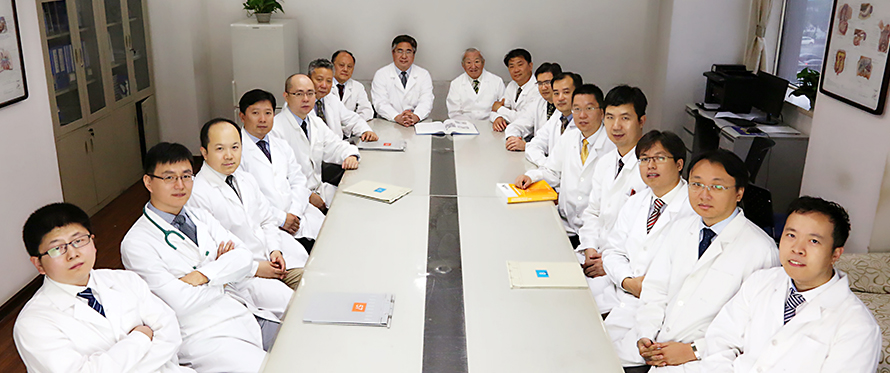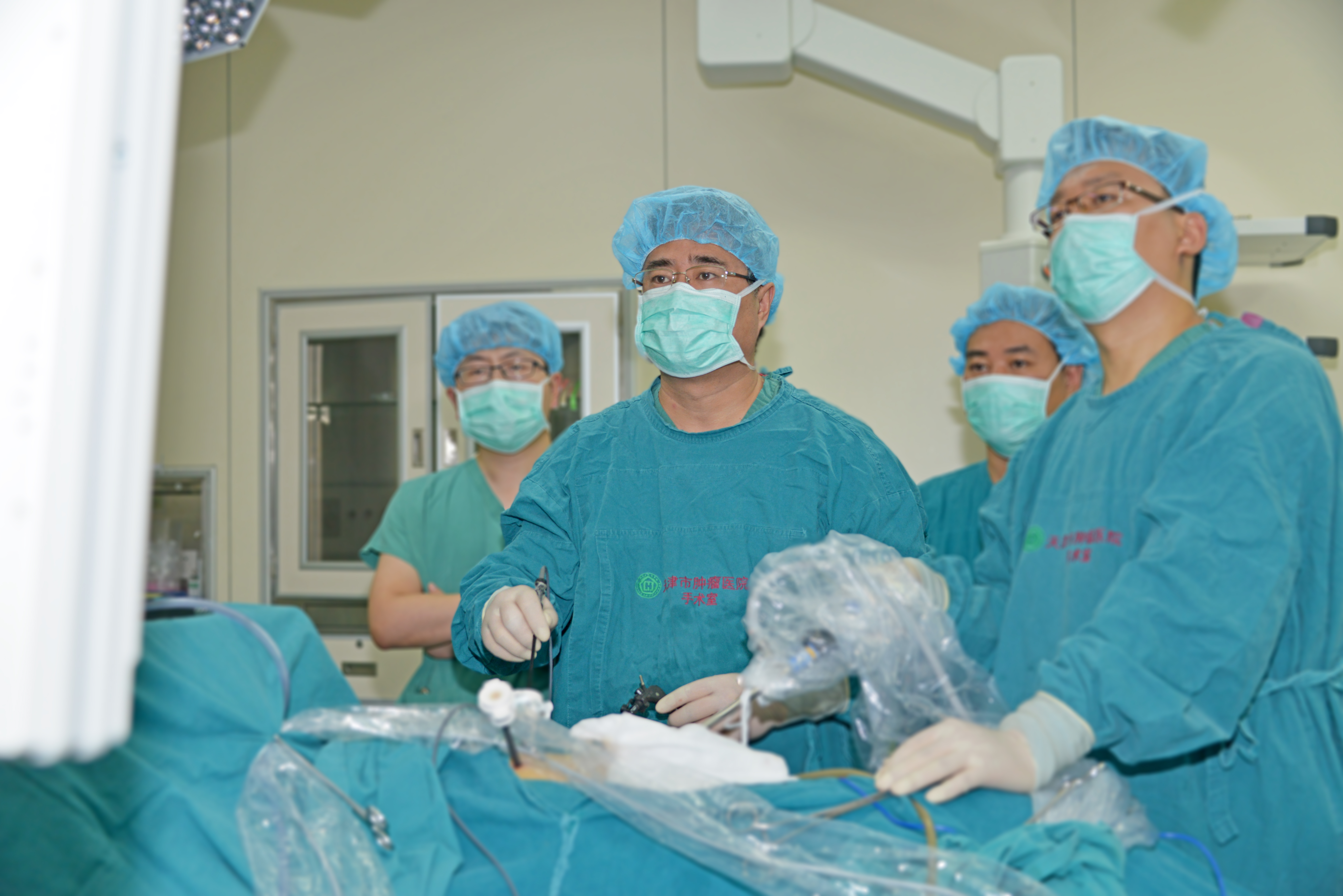
General Introductoin
The
Department of Esophageal Cancer, Tianjin Medical University Cancer Institute and
Hospital was established in 1999. It was the first esophageal oncology division
established in a Chinese oncology hospital. It hosts the seat of the Chairman
of the Division of Esophageal Cancer, The Chinese Anti-Cancer Association. In
2012, it was awarded the National Key Specialist Division of Thoracic Surgery
by the Ministry of Health. The division has 80 beds and 16 professional and
technical personnel, including 4 chief physicians and 6 deputy chief
physicians. The proportion of patients from other regions is more than 60%.
There are more than 7,000 patient visits, and more than 1,000 hospital
inpatients per year. The division has completed more than 700 thoracic surgical
procedures per year. The surgical resection rate is more than 98%.
The department undertook the teaching work for the national oncologist training classes and has trained hundreds of outstanding esophageal cancer professionals, which has played an important role in promoting the professional development of esophageal cancer work in China.
Research
The
department focuses on the simultaneous development of clinical and scientific
research. They have participated in writing 《Mediastinal surgery》, 《Mechanical
thoracic tumor surgery》, 《Esophageal
angioplasty》, 《Mediastinal oncology》 and
other books. The department is undertaking three National Natural Science
Foundation projects, two provincial and ministerial level projects, two lead
clinical trial fund projects, and five domestic multi-center clinical research
projects. At present, the department has published over 30 SCI papers and
nearly 100 papers have been published in the Chinese core journals, and more
than 30 doctoral and master students are mentored in this department.
Main Clinical Trials
1.
CheckMate 577: A randomized, double-blind, phase 3 study of nivolumab (Nivo) or
placebo in patients (Pts) with resected lower esophageal (E) or
gastroesophageal junction (GEJ) cancer(NCT02743494)
2.
Neoadjuvant Chemoradiotherapy VS. Neoadjuvant Chemotherapy followed by
Minimally Invasive Esophagectomy for Locally Advanced Resectable Esophageal
Squamous Cell Carcinoma(cT3-4aN0-1M0) :A Multi-center Prospective Randomized Clinical Trial (NCT03001596)
3.
Ivor-Lewis resection versus left thoracic resection after neoadjuvant
chemotherapy for gastroesophageal junction adenocarcinoma (cT1bN+,
cT2-T4aN0-N+): A multi-center prospective randomized clinical trial (ChiCTR-IIR-17013113 )
4.
A Phase III Trial Comparing Paclitaxel, Cisplatin Plus 5-FU (TCF) Versus
Radiotherapy With Paclitaxel Plus Cisplatin (TC-RT) as Preoperative Therapy for
Locally Advanced Esophageal Squamous Cancer (NCT03366883)
5.
Multi-center Prospective Randomized Controlled Clinical Trial of Postoperative
Adjuvant Chemotherapy, Adjuvant Radiotherapy, or Surgery Alone for High-risk
Histological Node Negative Patients With Thoracic Esophageal Squamous Cell
Carcinoma (NCT02891083)
6.
A Phase III, Multicenter Randomized Controlled Study of Neo-adjuvant
Chemotherapy Paclitaxel + Cisplatin Versus Surgery Alone for Stage IIA-IIIB
Esophageal Squamous Cell Carcinoma(NCT02395705)
7.
A phase III clinical trial of neoadjuvant chemoradiotherapy followed by surgery
versus surgery alone for locally advanced squamous cell carcinoma of the
esophagus (NEOCRTEC5010)
Main publishment in recent 3 years
1.
Duan XF, Tang P, Shang XB, Jiang HJ, Yu ZT. Metastatic to negative lymph node
ratio demonstrates significant prognostic value in patients with esophageal
squamous cell carcinoma after esophagectomy[J]. Oncotarget. 2017,
8(49):86908-86916.
2.
Ma Z#, Wu X#, Xu B, Jiang H, Tang P, Yue J, Ma M, Chen C, Zhang H, Yu
Z*.Development of a novel biomarker model for predicting preoperative lymph
node metastatic extent in esophageal squamous cell carcinoma1[J]. Oncotarget.
2017,8(62):105790-105799.
3.
Qiao YF, Chen CG, Yue J, Ma MQ, Ma Z, Yu ZT*. Prognostic significance of
preoperative and postoperative CK19 and CEA mRNA levels in peripheral blood of
patients with gastric cardia cancer[J]. World J Gastroenterol. 2017, 23
(8):1424-1433.
4.
Ma Z, Chen C, Tang P, Zhang H, Yue J, Yu Z*. BNIP3 induces apoptosis and
protective autophagy under hypoxia in esophageal squamous cell carcinoma cell
lines: BNIP3 regulates cell death[J]. Dis Esophagus. 2017; 30 (9):1-8.
5.
Yang M, Zhang H, Ma Z, Gong L, Chen C, Ren P, Shang X, Tang P, Jiang H, Yu Z*.
Log odds of positive lymph nodes is a novel prognostic indicator for advanced
ESCC after surgical resection[J]. J Thorac Dis. 2017. May;9(5):1182-1189
6.
Gong L, da Silva Caetano M, Cumpian AM, Daliri S, Garza Flores A, Chang SH,
Ochoa CE, Evans CM, Yu Z, Moghaddam SJ. Tumor necrosis factor links chronic
obstructive pulmonary disease and K-ras mutant lung cancer through induction of
an immunosuppressive pro-tumor microenvironment[J].Oncoimmunology. 2016,
5(10):e1229724.
7.
Zhang HD, Tang P, Miao XH, Gao YY, Shang XB, Gong L, Ma Z, Yang MJ, Jiang HJ,
Zhan ZL, Meng B, Yu Z*. Does tumor size improve the accuracy of prognostic
prediction in patients with esophageal squamous cell carcinoma after surgical
resection[J]. Oncotarget.2016, 7(41):66623-34.
8. Zhang HD, Shang XB, Chen CG, Gao YY, Xiao XM, Tang P, Duan XF, Yang MJ, Jiang HJ, Yu Z*. Lymph node ratio-based staging system as an alternative to the current TNM staging system to assess outcome in adenocarcinoma of the esophagogastric junction after surgical resection[J]. Oncotarget. 2016, 7(45):74337-49.
Clinical Service
The
Department of Esophageal Cancer has traditionally focused
on esophageal, cardiac, lung, and mediastinal tumors, and has placed greater
emphasis on standardization, individualization, and precision in the diagnosis
and treatment of tumors, especially in the aspects of minimally invasive
operation. Many new technologies, new concepts and other aspects of the
diagnosis and treatment are in the international and domestic leading position.
The department advocates right thoracic surgery for esophageal cancer. It paid
attention to the removal of lymph nodes in the upper mediastinum, especially
the left and right recurrent lymph nodes, and advocated three-field lymph node
dissection. Our department performs thoracic and laparoscopic treatments for
esophageal and cardiac cancers, achieving 80% of minimally invasive surgeries.
The department took the lead in carrying out the standardized clinical
diagnosis and treatment of esophageal cancer, and simultaneously carried out
the MDT multidisciplinary treatment model for patient's individualization. The
preoperative adjuvant therapy, minimally invasive surgery, and comprehensive
treatment were combined to give greater emphasis to the treatment of esophageal
cancer. Pay more attention to the radical and perioperative management of
surgery, reducing the incidence of complications such as pulmonary infections,
anastomotic leakage, and strive to prolong the survival of patients. In 2016,
the world's latest Da Vinci robot was introduced for surgery. At present, the department
has completed more than 300 cases of minimally invasive surgery for esophageal
cancer per year.
